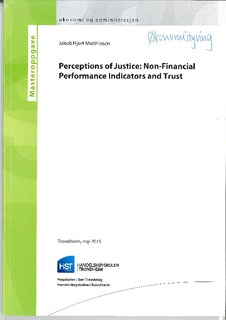| dc.description.abstract | This thesis reviews the behavioural effects of one of management accountings most extensively
applied control tools: The performance appraisal. Employees are subject to performance
appraisal on a regular basis, influencing perceptions of the employer, ourselves and our work
life. It is on this perception we act, making appraisal a powerful tool.
The adaption of social exchange theory and a multifoci perspective provides a relevant
framework for the thesis, identifying several key variables of human behaviour. The research
model presents four variables linked to performance appraisal. It is hypothesized that nonfinancial
performance measures in performance evaluation are positively associated with trust
in the superior or with trust in the organization. Furthermore, it is hypothesized that this effect
is mediated by perceptions of procedural and interactional justice; whether procedures and
processes at work are fair and whether the interpersonal and informational treatment of the
employee is fair, respectively. To examine the research questions, structural equation modelling and the statistical modelling tool LISREL is applied on a data sample gathered at a middle sized European real estate company. The survey and research design facilitates statistical analyses by examining individuals’ perceptions of the importance of financial and non-financial performance indicators, trust and justice. The results indicate that performance appraisal based on non-financial performance indicators have a meaningful effect on employees’ trust in the organization and in the superior. Additionally, the indirect effect of non-financial performance indicators on justice is substantially larger than the effect of financial indicators, indicating that non-financial performance measures are perceived as more just. Finally, the results indicate that an alternative approach, where focus is shifted towards corporate strategy instead of financial and non-financial indicators, may be more appropriate in explaining the effects of performance appraisal on behaviour. | nb_NO |
